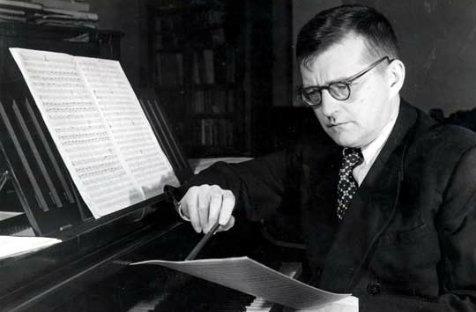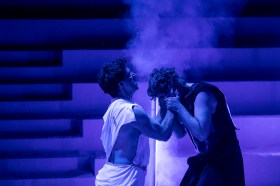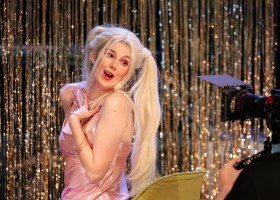It’s probably not a good idea to revisit one’s memories. The past throws both wondrous and hideous shadows on each of our futures – that wall that forever stays in front of us – and we are constant fools that always think these silhouettes to be better or worse than they ever could have been. No shadow can represent something unbearable, as anything truly unbearable would not let us live to have the memory; neither can ecstasy be there, for we would never see anything else. Everything in between, however, is up for grabs, and truth is often merely what you make of it.
Is there, for instance, a definitive performance to be had of a piece of music? Or, to take a more theatrical bent – can there be a definitive production of a play? After having one of the best nights out at the theatre that you’ve ever had – a production of a Shakespearean comedy, for instance – is there any point to seeing another production? Could subsequent versions ever live up to the memory? Is there, perhaps, something to be gained by merely taking the newer productions for what they are, and enjoying oneself nonetheless, or will one’s experience always be tainted by disappointment? The answer, most likely – as with many things in life – is that it is all subjective, that one man’s headache is another man’s definitive version, and so on. And I am happy, for instance, to travel to a concert and listen to the New World symphony more than once a year, no matter how good or bad the performance is (Dvorak’s music being very tamper-proof, I find), but for other pieces I have more varied feelings. To summarise: it’s all very complex, and there’s no end to it.
My reason for all this musing is that, as I was sitting in the City Recital Hall and listening to Selby & Friends’ latest concert – entitled First, Last and Only – I was struck by a sense of immense déjà vu. I had heard these pieces before. (This, as you can imagine, dear reader – what with the fetish audiences have nowadays for the tried and true classics of the repertoire – is not an uncommon event in my life.) But one is young, and one has not had the entire Western Canon pummeled into one’s consciousness as of yet, so there are still works to discover. But not this night. Especially not this night. For not only had I heard the pieces before (and there’s nothing wrong with that), I had also heard the concert before.
It was in May last year that Trio Dali came to our shores – invited here by Musica Viva – to give a concert in the very same place. On the program they had Gordon Kerry’s Im Winde, Ravel’s Piano Trio in A minor, and Schubert’s Trio in E flat major. I believe I was ambivalent towards the Kerry, ecstatic at the Ravel, and impressed by the Schubert. Selby & Friends (the friends being Susie Park on violin and Timo-Veikko Valve (of the ACO) on cello) had swapped the Kerry for a Shostakovich – Piano Trio No. 1 in C minor – but that was all. Yet it gets stranger.
Trio Dali, having had an encore demanded by the audience, chose to give them a movement from Dvorak’s Dumky trio. Selby & Friends, having duly impressed the audience as well, gave us a choice of either revisiting the Ravel (‘Timo wants to have another go at the Ravel,’ said Ms Selby) or something by Dvorak. The audience near-unanimously called for the Dvorak, and we were given – wait for it – a movement from the Dumky trio. (One cannot be sure if they were the same movements, however.) What, dear reader, I wonder, are the chances of that happening? Somewhat astronomical, I suspect. (It should be noted that I’m not accusing anyone of plagiarism, by the way – not that there would be a good case for it even if I were.)
It was rather bewildering, although it didn’t fully hit me until I returned home and looked at my review for Trio Dali. Still, if life keeps serving you lemon after lemon, keep on making lemonade after lemonade. The first piece – the Shostakovich – was also the composer’s first piano trio, and – useless as it might be to say it – it felt like a definitive performance. The players managed to balance the grotesqueries and romances so seamlessly together that the one-movement work never stopped flowing.
As for the Ravel and the Schubert? Great, but not as great as I remember. But it can be very hard to enchant a second or third time, unfortunately. I think Trio Dali had the better of the Ravel, but the Schubert – even with a flawed first movement – was a close contender, having a bit more life to it in the version under review.
The performances were all more than satisfactory, however, with a lovely combination of lyrical beauty and vigorous technicality. It will be the Shostakovich that I will remember, though, and heaven help any more performances of it in the near future.
Rating: 4 stars out of 5
First, Last and Only
Selby and Friends
Susie Park (violin), Timo-Veikko Valve (cello) and Kathryn Selby (piano)
Dmitri Shostakovich – Piano Trio No.1 in C minor, Op.8
Maurice Ravel – Piano Trio in A minor
Franz Schubert – Trio in E flat major for piano, violin and cello, Op 100, D 929
City Recital Hall, Angel Place, Sydney
11 April






